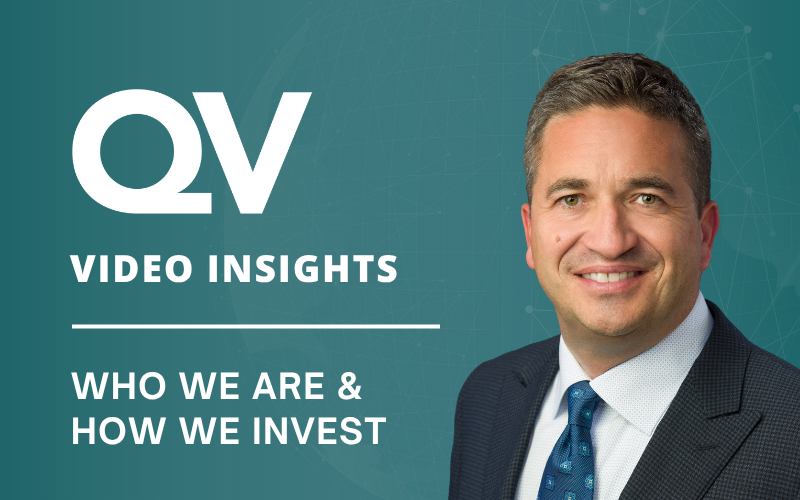Market anticipation mounted up to the US Federal Reserve decision on how much interest rates would be increased. After Wednesday’s third 0.75% increase, headlines reflected “US stocks tumble after Fed raises rates again” and the more sedate “stocks finish lower after Fed decision” following the 1.7% decline in the S&P 500. The recent hyper focus on central bank’s moves, swirling inflation, and recession questions are understandable. Significant market events are important, but rapidly shifting client capital in anticipation or reaction to macro news has not historically been part of QV’s DNA. We are macro ‘aware’ but focus on matters realistically within an investor’s influence or purview, including what is owned, not owned, or on the ‘wish’ list.
Amidst the stream of news flow and worries, below are some first principles or touchstones governing our capital allocation at QV.
Long-term focus – Sometimes we are asked, what differentiates QV? We typically relate our historical average investment time horizon of four to five years to both clients and prospective management teams. A follow-on question may be, is that really differentiated – who isn’t long-term? Data from the New York Stock Exchange going back to 1930 reflects the reduced time horizons or holding periods of stocks in years in the market. The chart below reflects that the holding periods of stocks has shrunk from 5+ years in the ’60s – ‘70s to approximately two years in the ‘90s. As of 2020, the average hold period was down further – to less than a year or approximately 6 months!

Note: Holding periods measured by value of stocks divided by turnover
Source: NYSE, Refinitiv
As a result, it is no wonder why the markets can be myopic or short-sighted as many more seem to think in quarters or months instead of years.
In contrast, long-term thinking may have some benefits including that it helps reduce the likelihood of getting caught in recency bias or giving too much weight to most recent events in decision making. Another benefit is that a difference in time horizon can allow for opportunistic purchases when negative recent news may be overshadowing the underlying fundamentals.
In practice, the recent positioning in QV holding Stella-Jones may be an indication of our long-term focus. After reaching record results during the pandemic, the company anticipated a normalizing of outsized profits. Share prices have declined steadily from May 2021 to May 2022. Rather than focusing on the near-term weakened earnings momentum, our focus has been on the long-term earnings power supported by resilient demand for railway ties and utility poles, as well as attractive value. Over the past year or so, this longer perspective has supported Stella-Jones being built into one of the larger exposures in the strategy. Value wise, it trades at less than 11x earnings or 9% earnings yield, which is still attractive relative to US 10-year bonds which hit 3.7% this week. Though one example, it highlights how a long-term focus can benefit the strategies.
Do your own homework – September marks the start of the school year and many are ‘hitting the books’. The importance of always doing your own due diligence cannot be understated. Choosing a school may involve reviewing strengths and weaknesses, site visits, and interviews with alumni and staff. Should a purchase of an ownership stake in a business be any different? “Consensus” has many freely given views, but Mr. Market does not have skin in your game. He will not pay your bills, cover your losses, or meet your retirement needs. Thoughtful in-depth research and decision making which considers risk & reward, industry challenges, economic conditions, and company specific plans are required.
Independent thought – Howard Marks succinctly captures an important concept about the active investing reality in his note, “Dare To Be Great”:
“ Only if the behavior is unconventional is your performance likely to be unconventional . . . and only if the judgments are superior is your performance likely to be above average. ”
A simple interpretation of this thought may be, don’t expect different performance without different thinking and behaviours than the market. A loss averse, long-term focus through market cycles has helped guide us through increasing short-termism, accelerating news flow, and abundant competition surrounding us. Secondly, our judgement is enhanced by the consistent focus on our bottom-up research driven investment process.
To conclude, there will always be much to fixate on and fret over in the markets. While macro aware, our behaviour will be driven by our mindset. Our investing mindset strives for consistently independent thinking, not just to be contrary, but buttressed by a long-term perspective and informed by insightful analysis of our holdings.




